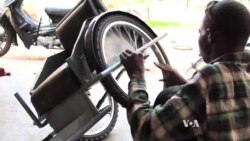An estimated 20 million people in Nigeria have physical handicaps. With few opportunities for work, many have resorted to street begging. But a group of disabled men in Kaduna state are encouraging others to get off the street by empowering them with new skills.
These men are waiting for food from a local charity. It may be their only meal today. Disabled, most rely on street begging to sustain them.
Unlike the others queuing here, 18-year-old Aliyu Yakubu is learning to fix tricycles and do other metal work to earn a living.
Yakubu remembers the moment he decided to quit begging.
“My former class prefect saw me begging on the street and didn’t recognize me. He gave me some money," he said. "When I stretched my hand out to collect it, then he saw my face. I felt ashamed, and, since then, I decided not to beg again.”
Instructor Isiaka Maaji, himself physically disabled, helps people like Yakubu get off the streets and learn a trade.
He got his own skills from a state-run vocational rehabilitation training program and has been training others since 2002. Five years ago, he began encouraging physically challenged people to abandon begging.
“We encourage people like us to learn skills they can do to become self-reliant to support themselves and their families, because being in the streets as beggars is a disgrace to all of us,” Maaji said.
So far he’s helped and trained 30 people – some of whom now have their own metal workshop.
They make tricycles and motorbikes designed for the handicapped – but also doors and windows to sell.
But a member of the Handicapped Association, shop owner Ridwan Abdillahi, says the general public is not buying despite the good quality of the products.
“I believe the society are seeing the goods or products made by persons with disability as disabled too,” he said.
These men – used to overcoming challenges – say this is one more hurdle the disabled face. They say they will tackle it by raising awareness, with the help of the government and the community.





